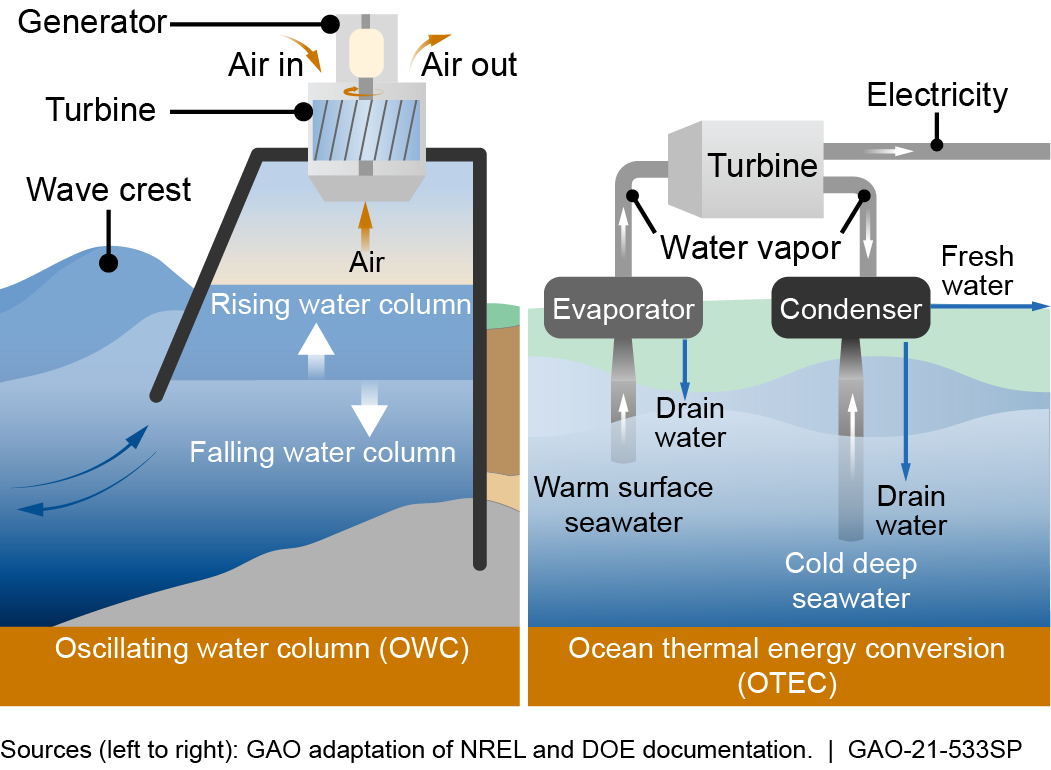Ocean Power

Example of an oscillating water column and an OTEC power plant (U.S. Government Accountability Office)
Ocean power harnesses the energy from ocean waves, tides, and temperature differences to generate electricity. This renewable energy source has the potential to significantly contribute to reducing greenhouse gas emissions and mitigating climate change.
Overview
- Tidal Power: A source of accessible, natural and consistent clean energy - Climate Tech Distillery
Ocean Power technology has made significant progress in recent years, particularly in the development of Wave Energy Converters (WECs) and Tidal Energy Converters (TECs). These devices extract energy from ocean waves and tides, respectively, and convert it into electricity.
Key technologies include:
-
Oscillating Water Column (OWC): A partially submerged structure with an open chamber at the top. As waves pass over, they drive water movement that powers a turbine to generate electricity.
-
Tidal Stream Generators: Underwater turbines that capture energy from tidal currents.
-
Ocean Thermal Energy Conversion (OTEC): Systems that use temperature differences between warm surface water and cold deep water to drive a heat engine and produce electricity.
Organizations like the U.S. Department of Energy, the Electric Power Research Institute, and the European Marine Energy Centre are at the forefront of developing and testing these technologies.
Progress Made
-
Wave and Tidal Power: Significant advancements have been made in harnessing energy from ocean waves and tides. Companies like Ocean Power Technologies and Eco Wave Power have deployed commercial-scale wave energy devices.
-
Offshore Wind Integration: Some ocean power technologies are being integrated with offshore wind farms, creating hybrid systems that can provide more consistent power output.
-
OTEC Development: Countries like Japan and Hawaii have made progress in developing and testing OTEC systems, although they remain largely in the pilot stage.
Challenges Ahead
-
Technology Cost: Ocean power technologies are still relatively expensive compared to other renewable energy sources. Reducing costs through technological improvements and economies of scale is crucial for widespread adoption.
-
Environmental Impact: Concerns about the potential effects on marine ecosystems need to be carefully addressed. This includes studying the impact on marine life, sediment flow, and coastal erosion.
-
Durability: Developing materials and designs that can withstand the harsh marine environment over long periods is an ongoing challenge.
-
Grid Integration: Integrating the variable power output from ocean energy systems into existing electricity grids presents technical challenges.
Solutions and Companies
- Ocean Power Technologies (OPT): Develops wave energy conversion technologies and provides ocean energy solutions.
- Eco Wave Power: Specializes in onshore wave energy technology.
- Orbital Marine Power: Develops floating tidal stream turbines.
- SIMEC Atlantis Energy: Focuses on tidal power projects and technologies.
- Ocean Energy: Develops wave energy converters for utility-scale electricity generation.
Best Path Forward
To accelerate the development and adoption of ocean power technologies:
-
Increase R&D Funding: Continued investment in research and development is crucial to improve efficiency, reduce costs, and address technical challenges.
-
Policy Support: Governments should implement supportive policies, such as feed-in tariffs or renewable energy credits, to encourage investment in ocean power projects.
-
Environmental Studies: Conduct comprehensive environmental impact assessments to ensure the sustainable deployment of ocean power technologies.
-
Industry Collaboration: Foster partnerships between technology developers, utility companies, and marine engineering firms to accelerate commercialization.
-
Public-Private Partnerships: Encourage collaboration between government agencies, research institutions, and private companies to share knowledge and resources.
-
International Cooperation: Promote knowledge sharing and collaboration across borders to accelerate global progress in ocean power technologies.
By addressing these challenges and leveraging the progress made, ocean power has the potential to become a significant contributor to the global renewable energy mix and play a crucial role in mitigating climate change.